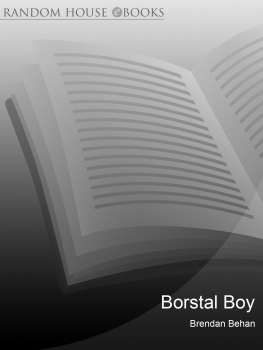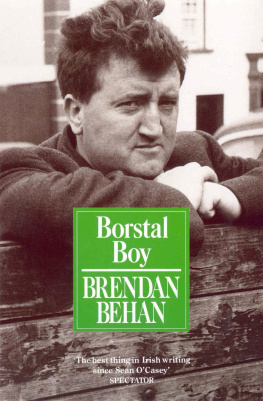First published in 1970
by Routledge
Reprinted in 1998, 2002
by Routledge
2 Park Square, Milton Park, Abingdon, Oxon, OX14 4RN
Transferred to Digital Printing 2007
Routledge is an imprint of the Taylor & Francis Group
1970 Erica Stratta
All rights reserved. No part of this book may be reprinted or reproduced or utilized in any form or by any electronic, mechanical, or other means, now known or hereafter invented, including photocopying and recording, or in any information storage or retrieval system, without permission in writing from the publishers.
The publishers have made every effort to contact authors/copyright holders of the works reprinted in The International Library of Sociology. This has not been possible in every case, however, and we would welcome correspondence from those individuals/companies we have been unable to trace.
British Library Cataloguing in Publication Data
A CIP catalogue record for this book is available from the British Library
The Education of Borstal Boys
ISBN 0-415-17737-5
The Sociology of Law and Criminology: 15 Volumes
ISBN 0-415-17832-0
The International Library of Sociology: 274 Volumes
ISBN 0-415-17838-X
Publishers Note
The publisher has gone to great lengths to ensure the quality of this reprint but points out that some imperfections in the original may be apparent
Foreword
by
T. P. MORRIS
The idea that education, or rather the lack of it, is a contributory factor in the crime of the young is far from new. Throughout the 19th century it was a recurring theme in the writings of almost anyone concerned with the moral reclamation of juvenile delinquents. The elementary skills of the three Rs, and especially reading, were regarded by many advanced reformers as of crucial importance; on occasion the enthusiasm could be excessive, and for a time the emphasis in the regime of the Berkshire County Gaol led to its being known among its habitus as the Read-Read-Reading Gaol.
To a modern observer it seems scarcely surprising that at a time when the mass of the common people had but minimal access to primary education, the average young offender would be unable to read and write. The moral aspect of education was seen by reformers in terms of increasing the exposure of the lower orders to the benefits of moral education through the printed word.
Joseph Fletcher wrote in 1848:
Without a proportionate advancement in the morality of society each new change in material civilisation will lead to frequent incentives to disorder among the people at large... amidst those classes whose moral ties to the existing framework of society are feeblest, and least felt or understood, and to many of whom Socialism, or any other destructive theory would appear as consistent with their well-being as the most cherished axioms of Political Science, or even the words of Christian Truth Itself.
Literacy then, was to be a bulwark against moral decay and the Bible of King James a principal instrument of moral education.
The sociologist who is given to excursions within the thickets of such pompous Victorian prose must be forgiven if, when reading some of the letters addressed nowadays to the Editor of The Times, he experiences a sense of dja vu. But whereas the intensity, quality and duration of popular education in the last century was recognized as limited, the same cannot be said for developments within the lifetime of those now living. There is little doubt that the improvements have been massive since the turn of the century. It has been said that we now spend more on education and delinquency is of a more complex nature. The pioneer work of Sir Cyril Burt in the 1920s demonstrated that among delinquents, those whose educational standards were low were not as dull as their attainments would appear to suggest, but rather that there was a distinct gap between their potential and their measured abilities.
The reasons for this state of affairs are various. Poor school attendance may be a direct result of parental irresponsibilityperpetually allowing children to oversleep and miss school just as father misses workor frequent changes of school. Emotional disturbance and consequent truancy may also play a part. But the problems of teaching children in large classes under far from satisfactory conditions cannot be excluded. In the not so recent past some Education Authorities have played down the idea that the blackboard jungle school exists other than in the imagination of certain disaffected supply teachers. We now know that there is such a thing as the Educational Priority Area and that the conditions which have been highlighted by the presence of immigrant children have been there all the time.
It is entirely plausible to suggest that those boys who will drift through petty delinquency to more serious offences and finally enter the borstal system are more than likely to be found among those who have gone to the most socially disprivileged schools. They are likely to have had problems with authority and found themselves on the wrong side of the teacher, and have become bored during their last year when all that has been in their minds has been the anticipation of freedom from pedagogic restriction and the assumption of an independent wage earning role.
Both the Newsom and Plowden Reports have shown that a quarter of a century after the Butler Education Act, and a century since the introduction of state education itself, there is still much to be done. The borstal boy is, in the words of Newsom, to be found in that other half of our futurethe half that has done pretty badly compared with the new elite of the swollen sixth form and the lavishly expanded university. But that some 60 per cent of the boys seen by Dr Stratta wanted to leave earlier than they did suggests that secondary education, as they perceived it, had no attractions for them, and indeed was actively disliked by some. In some of her interviews one can detect a sense of resignation on the part of both teacher and boy:





